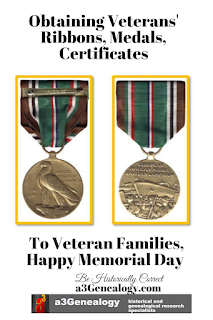Obtaining Veterans' Ribbons,
Medals, Certificates
It’s Memorial Day and we are
remembering the stories of our veterans. Did they serve overseas? Did they participate in a campaign in WWI or
WWII? Were they Korean War or Vietnam
veterans. Your veteran may have served in the Cold War or one of the early
wars.
Replacement Awards and Decorations
Often we hear of their heroic
actions, or details of their battles. Yet, the earned awards have been lost or
misplaced over time. But did you know veterans,
next of kin, and even the general public can receive replacement military
awards or decorations? This can include certificates of service, copies of your
veteran’s discharge papers, medals and ribbons. Veterans may even obtain a Cold
War Recognition Certificate.
What Is Needed
- Discharge Papers
specifying eligible awards, ribbons, medals
- Proof of Relationship: Birth
Certificate (next of kin), Driver’s License (veteran)
- Death Certificate,
obituary of Veteran (if next of kin)
4 Tips / Hints
- Obtain the
veteran’s military service record online, by mail, or by fax. Submit
Request.
- If your veteran’s
separation documents were lost in the 1973 St. Louis Fire (read about it here),
there are alternatives to locating discharge papers which will list awards
and decorations.
- Visit the National
Archives Military
Awards and Decorations page, for complete procedure and costs
information for replacement medals and ribbons.
- Cold
War Recognition Certificate may be available to members of the
armed forces and qualified federal government civilian personnel between 2
Sept 1945 to 27 Dec 1991.
More Information
Expect a 60-90 day response time to receive your
awards/decorations once all paperwork has been submitted.
Kathleen Brandt
a3Genealogy.com
Accurate, accessible answers







